- The Bottom Line Up Front
- How I Score My Zoho Alternatives
- 1) Puzzle: Best Overall for AI-Native Bookkeeping (My Top Pick)
- 2) QuickBooks Online: Best Mainstream All-Rounder
- 3) Xero: Best for Unlimited Users and Clean Bank Recs
- 4) Sage Intacct: Best Mid-Market Core Financials
- 5) Digits: Best AI-Native GL Architecture for Firms & Startups
- 6) Oracle NetSuite: Best for Complex Revenue and Scale
- 7) Odoo Accounting: Best Open-Core Flexibility
- 8) FreshBooks: Best for Freelancers and Services Micro-SMBs
- 9) Wave: Best Free-First Starter
- 10) ZipBooks: Best “Simple but Smart” on a Budget
- Where Zoho Books Still Shines (So You Don’t Switch For the Wrong Reason)
- Picking the Right Horse: Use-Case Playbooks
- Migration Gotchas (From the Controller’s Notebook)
- The Verdict
Last Updated on November 6, 2025 by Ewen Finser
Alright y’all, it’s time to roll up the sleeves and get practical. If you’re shopping alternatives to Zoho Books, then you’ve come to the right place. You’re probably feeling one of three pains: you’ve outgrown the SMB tier, you want more automation and less month-end grind, or your stack needs to plug into a specific ecosystem (sales, HR, ops) without utilizing spreadsheets and workarounds. I’ve tested, implemented, and cleaned up after most of these tools from the CPA chair, so I know what works and what doesn’t.
Below is my list of the best Zoho Books alternatives right now, with the in-the-weeds tradeoffs so you can pick what actually fits your workflow.
The Bottom Line Up Front
- Best overall for AI-first bookkeeping and real-time close: Puzzle: an AI-native ledger that drafts the bulk of categorizations and keeps you working continuously instead of batching at month-end. This one edges out as my top pick for modern finance teams that want fewer reclasses and faster reviews.
- Best mainstream all-rounder with deep accountant ecosystem: QuickBooks Online: Even though I hate to admit it, QBO has broad feature coverage, lots of third-party support, and familiar workflows. Just be prepared to pay for it.
- Best for unlimited-user collaboration and clean bank recs: Xero: strong multi-currency, tidy reconciliation, and Gusto-powered payroll in the US.
- Best for GAAP maturity and multi-entity mid-market: Sage Intacct: true cloud core financials, dimensional reporting, and close-time wins. It’s robust, solid, comprehensive, and deep. But you’ll need a team of accountants to get the most out of it.
- Best AI-native rethink of the GL for firms and startups: Digits: Autonomous General Ledger architecture with orchestrated AI agents. Its simple UI and ability to keep most things in house is really attractive.
- Best for complex revenue, compliance, and scale: Oracle NetSuite: ASC 606 revenue automation and rapidly expanding AI features make this a top pick for large, sprawling enterprises. Get your checkbook ready though, because it won’t be cheap.
- Best open-core flexibility: Odoo Accounting: broad suite, automated entries from sales/PO/stock; great if you want ERP-style cohesion without enterprise sticker shock.
- Best for freelancers and service micro-SMBs: FreshBooks: invoice-first UX with time tracking and lightweight accounting. This is for the business owners who just want to dip their toes in, and see if it makes sense.
- Best free-first starter option: Wave: no-fee basics with optional paid add-ons; good for solo operators who aren’t committed to a system that they won’t outgrow.
- Best “simple but smart” on a budget: ZipBooks: free tier with bank connect plus helpful “business health” insights.
How I Score My Zoho Alternatives
- Close velocity: fewer touches per transaction, fewer exceptions, cleaner variance flags. That puts time back in everyone’s pocket so you can focus on important things.
- Controls & auditability: source-doc traceability, approvals, role-based flows. You have to be able to trace who did what, and when.
- Revenue/expense ops: billing complexity, revenue recognition, vendor payments. These can vary wildly, for simple platforms like Wave to monstrous platforms like Oracle that could run Walmart levels of data.
- Ecosystem fit: payroll, HRIS, CRM, e-comm, and data warehouse friendliness are important considerations because you don’t want to have to use a spreadsheet to import payroll data into your accounting ERP every week.
- Total cost to run: subscription plus the very real cost of manual work. This goes without saying, but if it’s cost prohibitive, then most businesses won’t use it.
1) Puzzle: Best Overall for AI-Native Bookkeeping (My Top Pick)

What it is: An AI-first general ledger that learns your chart, vendors, and patterns, then drafts the majority of your categorizations continuously, with humans validating exceptions rather than hand-keying the bulk. Real-time status means less “month-end sprint” and more ongoing hygiene.
Where it wins vs Zoho Books:
- Automation depth: The platform focuses on drafting up to most categorizations automatically, reducing manual bookkeeping hours and pull-forward lag. Teams can also tap into a host of features via connectivity with platforms like Plaid, Gusto, Rippling, Brex, Ramp, etc., which really amplifies Puzzle as a powerhouse.
- Firm-friendly: Purpose-built experiences for accounting firms to standardize and accelerate close across clients (shared views, scalable controls).
Where it can fall short: If you need deep, native inventory or a sprawling prebuilt app store today, legacy suites may still have more knobs and levers for you to pull. In that case, you can work around with integrations where needed.
Best for: Startups, agencies, modern firms, and controllers who want AI to handle the drudgery while keeping a tight review loop.
Notable capabilities: AI categorization, real-time ledger, controllable reviews, integration friendly for plug and play from other platforms.
2) QuickBooks Online: Best Mainstream All-Rounder
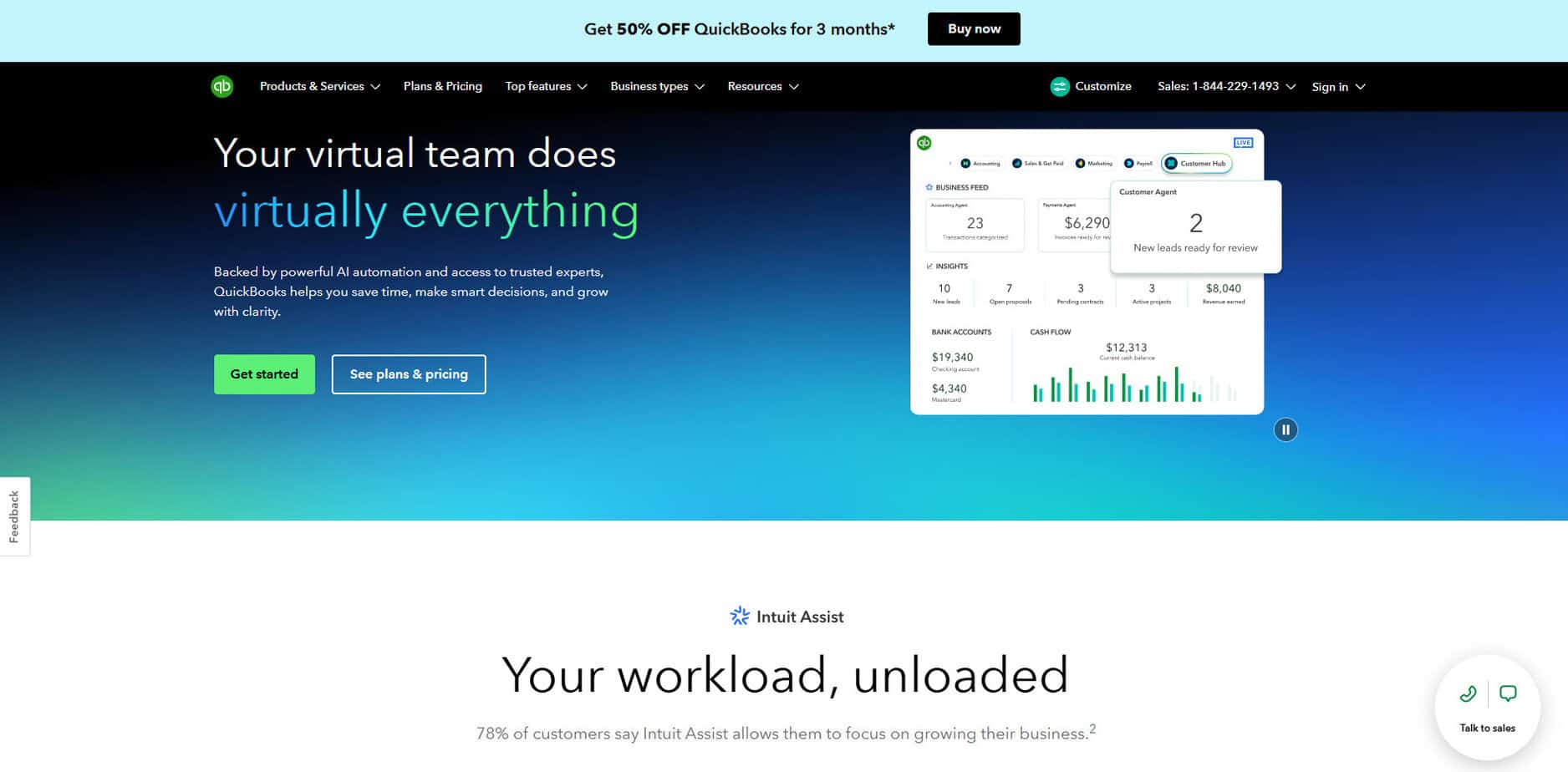
What it is: The household-name SMB accounting suite with invoicing, payments, expenses, reporting, and a massive accountant community.
Where it beats Zoho Books:
- Ecosystem gravity: App marketplace depth and a huge pool of ProAdvisors. It has serious staying power, and most people are familiar with it.
- Familiarity: If you hire bookkeepers or fractional controllers, odds are they’re QBO-native.
Tradeoffs: Periodic service hiccups can sting on critical days (this is true for any cloud suite, but QBO’s scale makes outages visible). Also, feature sprawl means settings debt if you don’t govern it well.
Best for: Small businesses that want a safe, well-trodden path with abundant talent and integrations.
3) Xero: Best for Unlimited Users and Clean Bank Recs

What it is: A polished, cloud-native accounting platform with excellent bank reconciliation ergonomics, multi-currency, and friendly collaboration. In the US, payroll flows through Gusto.
Where it beats Zoho Books:
- Collaboration model: Historically generous user model makes multi-stakeholder work painless.
- Reconciliation: Bank rules, matching, and daily hygiene are a pleasure when set up right.
Tradeoffs: Some advanced features or reports may require add-ons; US payroll is a partnered experience via Gusto, which is fine but not native.
Best for: Distributed teams, multi-currency shops, and accountants who obsess over clean bank rules.
4) Sage Intacct: Best Mid-Market Core Financials
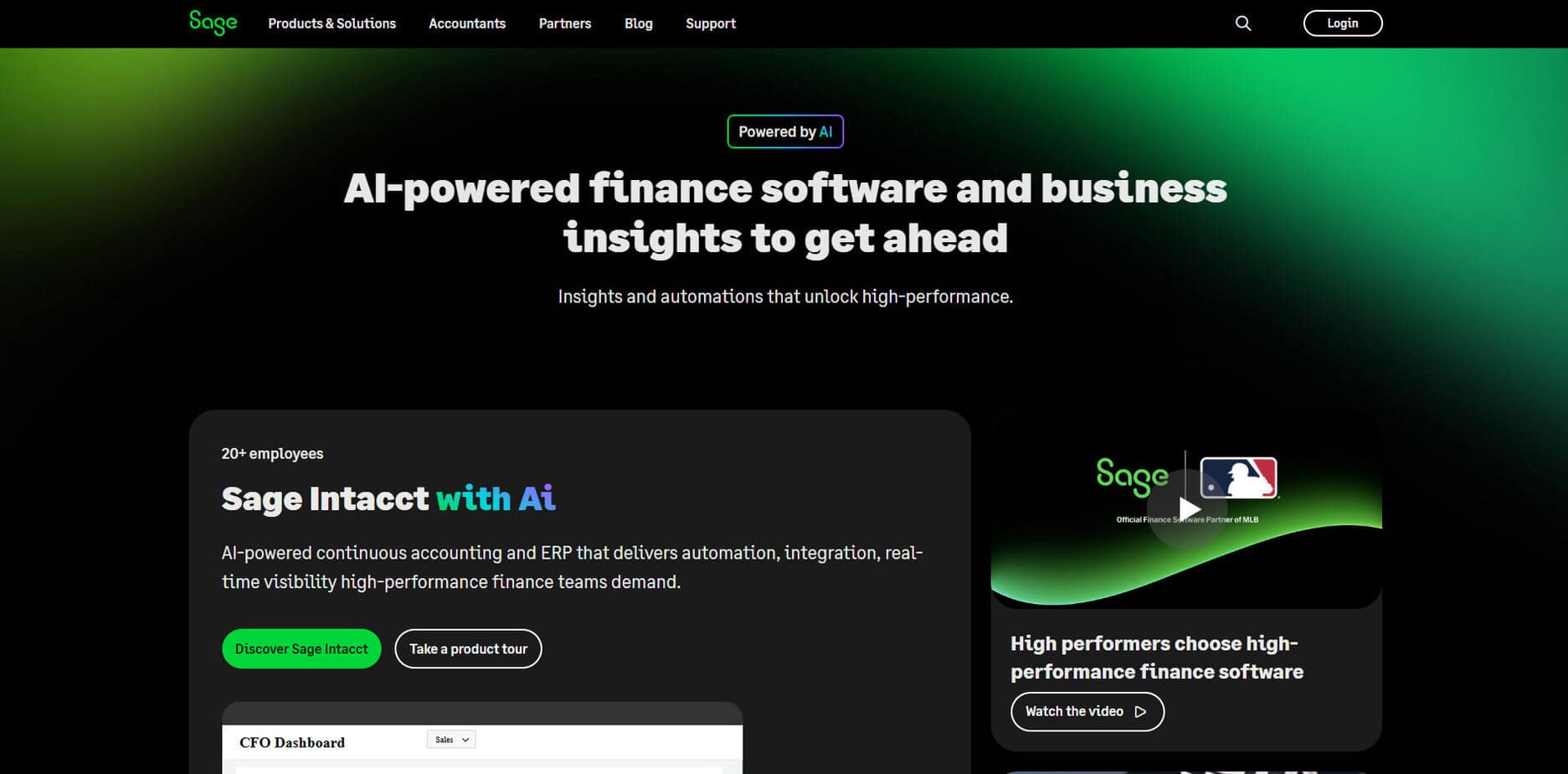
What it is: A true-cloud, GAAP-mature system with strong dimensions, approvals, and close acceleration. Think controller-grade. It’s robust, deep, and complicated.
Where it beats Zoho Books:
- Multi-entity and dimensionality: Roll-ups, entities, locations, departments are Intacct’s bread and butter. It’s a software designed for complicated business processes.
- Close-time: Users seldom struggle with close, but that’s typically because a team of at least four accountants are in the system, plus AP Clerks. Book keepers and people used to a simple interface should exercise caution as this platform can become overwhelming quickly.
Tradeoffs: Heavier implementation and cost vs SMB tools; you’ll want an implementation partner.
Best for: Multi-entity, project-heavy, or SaaS orgs growing out of entry-level ledgers.
5) Digits: Best AI-Native GL Architecture for Firms & Startups
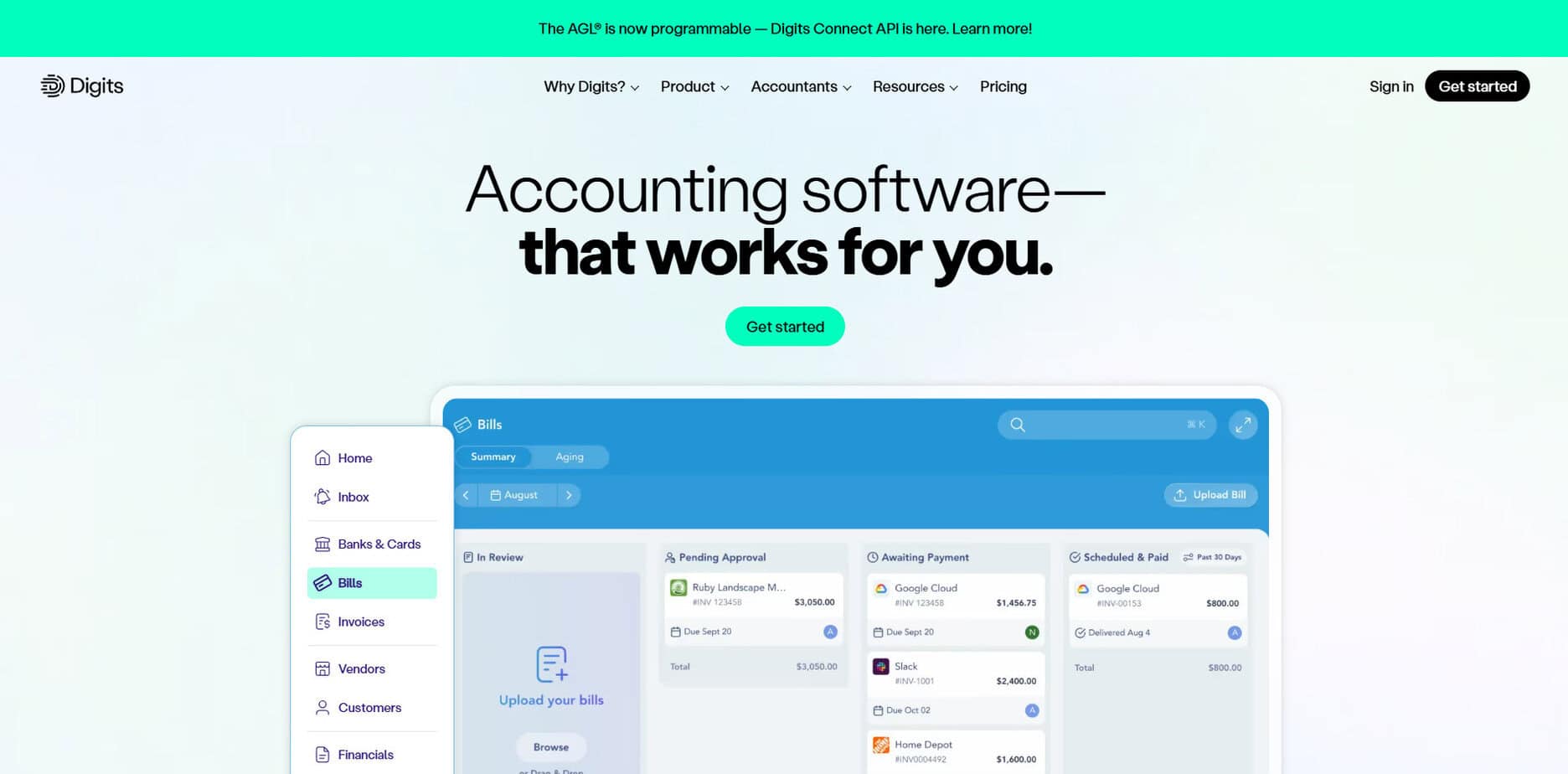
What it is: An Autonomous General Ledger built on a non-traditional platform that utilizes AI agents to attack bookkeeping end-to-end. It’s a deeper architectural rethink than “rules plus scripts.”
Where it beats Zoho Books:
- Automation DNA: Designed to automate classification, reconciliation assists, and document extraction continuously and in perpetuity.
- Firm tooling: Aiming to let pros supervise exceptions instead of hand-coding the 80 percent.
Tradeoffs: Newer ecosystem than the legacy incumbents, so you’ll need to vet integrations and your edge cases.
Best for: AI-curious firms and startups that want a radical reduction in bookkeeping touches.
6) Oracle NetSuite: Best for Complex Revenue and Scale

What it is: A mature, cloud ERP with robust accounting, order management, and supply chain modules. Advanced Revenue Management handles ASC 606 with arrangements, plans, and forecasting. Oracle has been layering in hundreds of AI features across workflows.
Where it beats Zoho Books:
- Revenue recognition: If you have multi-element arrangements, it’s night and day.
- Breadth: Finance plus inventory, fulfillment, and beyond in one suite means fewer brittle integrations.
Tradeoffs: Pricing, implementation lift, and governance. It’s absolutely feature overload for most small businesses and is overkill unless you’re running an enterprise.
Best for: High-growth SaaS, distribution, or omni-channel commerce with real compliance needs.
7) Odoo Accounting: Best Open-Core Flexibility
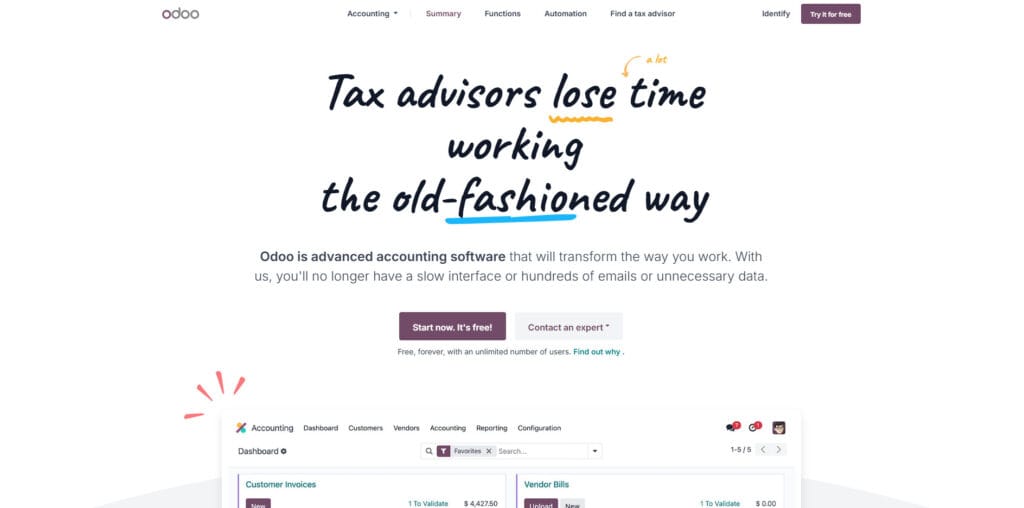
What it is: Accounting inside Odoo’s business suite. Invoices and journals are auto-created from sales orders, subscriptions, POS, inventory moves, and timesheets so finance rides on top of your operational source events.
Where it beats Zoho Books:
- Tight ops-to-finance loop: Fewer integration hop points when you also run Odoo CRM, Inventory, Projects, or Subscriptions. It’s similar to Zoho in that it’s everything you’d need under one umbrella.
- Customization: Open-core approach plus modules for niche processes.
Tradeoffs: You’ll want an Odoo-savvy implementer; governance matters to avoid “module sprawl.” It also takes time to learn the ins and outs of a system such as this.
Best for: Product companies and service orgs that want ERP-lite cohesion without NetSuite heft.
8) FreshBooks: Best for Freelancers and Services Micro-SMBs
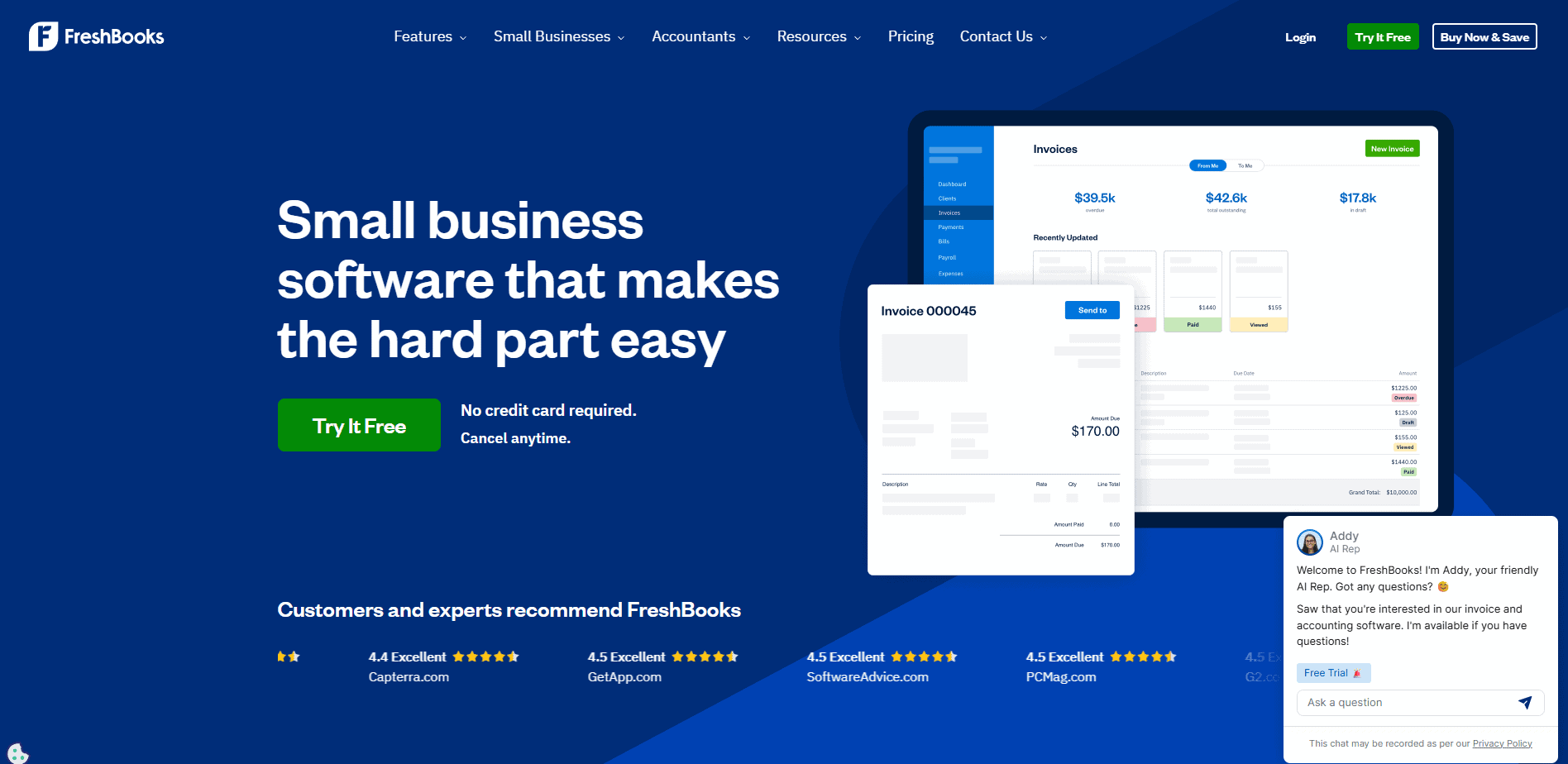
What it is: A client-service-friendly platform that nails invoicing, time tracking, expenses, and simple reports in a very approachable UI. It’s dead simple, and made for people who don’t mind running their own books.
Where it beats Zoho Books:
- Speed to invoice: If you live in proposals, projects, and time entries, this flow is buttery smooth
- Team collaboration: Straightforward for small teams that just need to bill, collect, and report.
Tradeoffs: Not designed for complex inventory or revenue recognition; keep it simple. Reporting is also lacking, so be comfortable with only having access to basic, standard reports.
Best for: Solo pros, small creative shops, agencies, contractors who want to look polished with minimal clicks.
9) Wave: Best Free-First Starter

What it is: A small-business suite with free core accounting and invoicing, with optional paid features like payments. Great for the earliest stage.
Where it beats Zoho Books:
- Price to learn: Zero-dollar entry to formalize your books, then layer on payments or a paid plan if needed.
Tradeoffs: Fewer advanced controls and reports; you’ll outgrow it super quickly if you scale.
Best for: Sole props and first-books businesses that need structure before they need power.
10) ZipBooks: Best “Simple but Smart” on a Budget
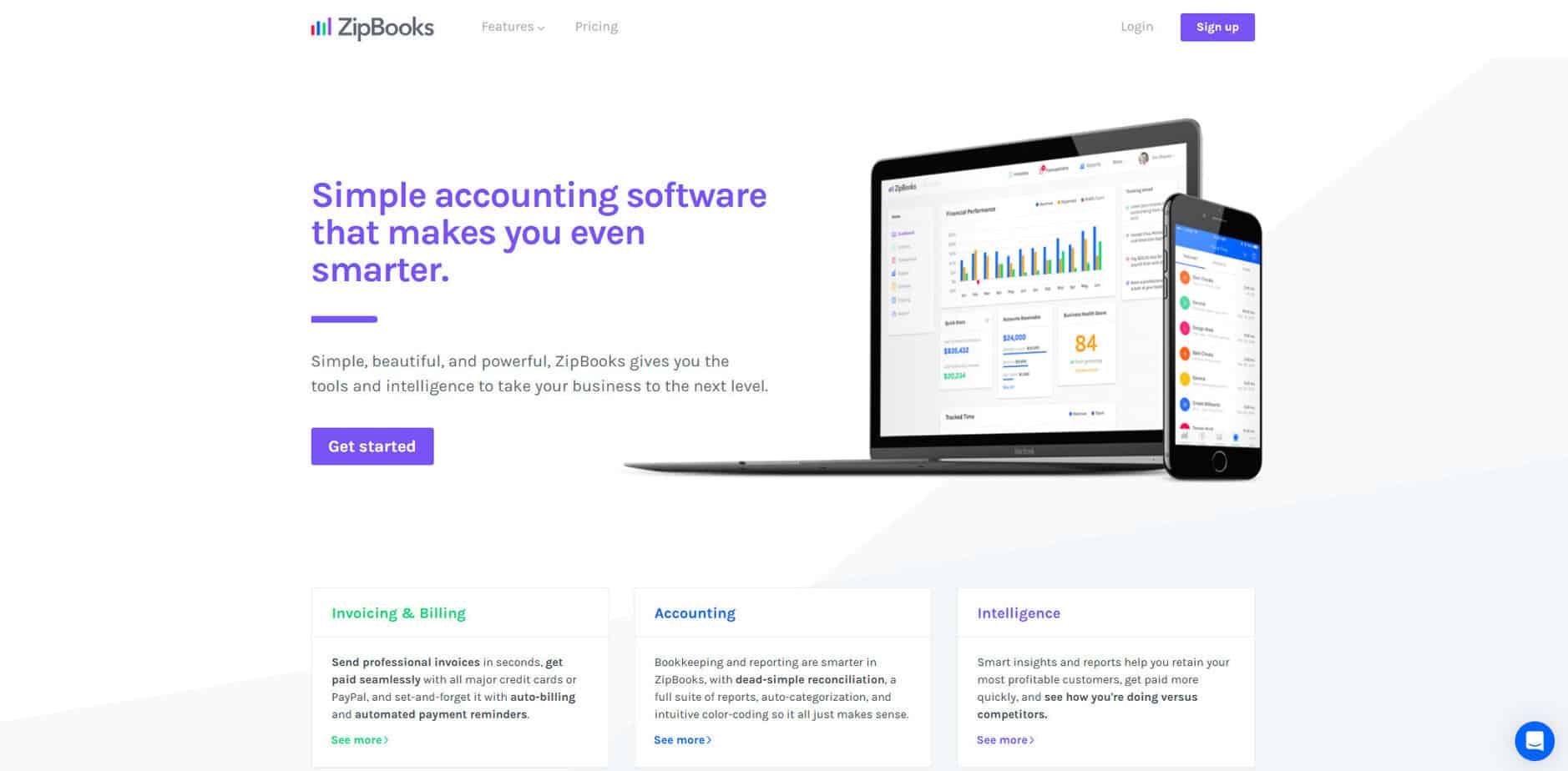
What it is: A lean accounting app with bank connections, basic reporting, and some clever guidance like a Business Health and Invoice Quality score to nudge better habits. There is a free tier available.
Where it beats Zoho Books:
- Coaching cues: The built-in health metrics help non-accountants course-correct before month-end surprises.
- Total cost: Attractive for very small teams that still want something smarter than a spreadsheet.
Tradeoffs: Narrower ecosystem and less advanced than typical systems.
Best for: Scrappy shops that want a little AI-ish guidance without the learning curve.
Where Zoho Books Still Shines (So You Don’t Switch For the Wrong Reason)
Zoho Books is a capable SMB accounting app with invoicing, bank feeds, inventory, automation workflows, and a broader Zoho suite if you’re already living in Zoho CRM or Projects. If your team is standardized on Zoho apps, the native integrations and pricing can be compelling. It’s a strong platform that absolutely works, but, if you’re looking for something cheaper, more narrowly defined, or need access to other platforms, then consider making the jump.
Picking the Right Horse: Use-Case Playbooks
- You want the fewest manual touches per month: Start with Puzzle or Digits. Both aim to shift you from batch bookkeeping to supervised automation with exception handling. Puzzle gets my nudge for real-time categorization at scale and firm-friendly workflows; Digits is architecturally bold if you’re excited about an AI-orchestrated ledger.
- You need the biggest talent pool and app store: QuickBooks Online. You’ll find specialists for any workflow and a plugin for almost anything. As an example, one of my clients uses a bank that has one branch. They’re a farming bank in rural Louisiana. Even they can connect to QBO for bank feeds.
- You want friendly collaboration and smooth bank rules: Xero. Add unlimited collaborators and enjoy daily hygiene. US payroll rides with Gusto.
- You’re multi-entity with board-level reporting: Sage Intacct or NetSuite. Intacct is a sweet spot for mid-market core financials; NetSuite adds heavier revenue and ops modules if you can afford it and truly need it.
- You want an ERP-ish suite without enterprise bloat: Odoo. Great if your invoicing, inventory, subscriptions, and projects already live in Odoo.
- You’re a freelancer or tiny team: FreshBooks or Wave. Get invoices out fast; keep the books tidy without overthinking.
Migration Gotchas (From the Controller’s Notebook)

- Chart of Accounts mapping: Don’t 1:1 copy the old sprawl. Collapse stale accounts and set strong bank rules on day one.
- Document provenance: Pick a home for source docs. If your new ledger lets you anchor receipts/bills to entries, enforce it.
- Revenue handling: If you have subscriptions or multi-element contracts, validate recognition settings early. NetSuite’s ARM or Intacct dimensions can save you later rework or keep it simple and defer until you truly need it.
- Access governance: Unlimited users are great; permissions matter more. Build a least-privilege matrix at go-live.
The Verdict
For teams that care about speed to close and less manual categorization, Puzzle is my overall pick among Zoho Books alternatives. It treats bookkeeping like a supervised, continuous flow rather than a monthly scramble. If you’re optimizing for ecosystem gravity and easy hiring, QuickBooks Online remains the safe all-rounder. If collaboration and multi-currency rule your world, Xero is a joy. Growing into mid-market complexity? Sage Intacct and NetSuite deliver the goods. Builders who want open-core flexibility should kick the tires on Odoo. Solo shops and micro-SMBs are right at home with FreshBooks, Wave, or ZipBooks.

